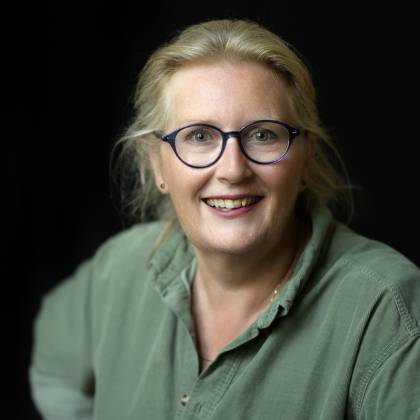
Would you like to learn more about commemorative funds?
Hanna Philips would be happy to discuss all the options with you.
INTERVIEW - ‘It was like a final chord for us – we wanted to do something important one last time.’ The married couple Berthie and Dick van Lith established a commemorative fund in support of the Concertgebouworkest musicians.
‘For us, it was always a given,’ says Dick. ‘If you value something, you do something in return. Otherwise it feels awkward.’ Years ago, he and his wife attended their first Concertgebouworkest concerts with friends who had a subscription and a couple of extra seats. Berthie and Dick soon took out a subscription of their own.
Berthie recalls, ‘Those wonderful concerts were truly a gift. So when we learned about the opportunity to do something in return for the orchestra, we seized our chance and became members of the Golden Guild.’ As time went by, Berthie and Dick took part in a number of donor events, and in 2016, they donated a beautiful set of boxwood clarinets, played by Arno Piters, to the orchestra.
At one point, the couple came into a large sum of money and wanted to do something meaningful with it. Dick says, ‘The Concertgebouworkest occurred to us immediately, and a commemorative fund turned out to be a good fit for us.’ A long process of reflection eventually led to the couple determining their aim. Berthie explains, ‘There are funds which help the orchestra purchase instruments or contribute to the Concertgebouworkest Academy or to education projects. The point is, they’re all focused on the music. Then it occurred to Dick that perhaps our own fund might be more people-oriented.’
Dick continues, ‘I suddenly realised that an orchestra is a whole, but it’s a whole made up of individuals. These are people who happen to enjoy making music, but who have their dark moments and problems just like everyone else. And despite that, they keep performing for us anyway. We decided the fund should help support the musicians personally, in cases where they might have problems involving their own health, children or studies.’
The meaning of music… All over the world, in every culture, when there’s something to celebrate and at so many other important moments, music gives people so much.
Arms and shoulders
Berthie and Dick started to talk to representatives of the Foundation and the orchestra’s HR Department. Was their idea feasible? Did the orchestra or individual musicians have any particular wishes of their own? After some initial reluctance, the orchestra’s enthusiasm started to grow. Dick says, ‘It turns out there was a real need – just think of all the physical problems so many musicians face. They’re constantly using their arms, shoulders and even mouths in such an intensive way. They’re like top athletes. All that use can lead to pain and particular injuries.’ Naturally, physiotherapy is already available to all the musicians, but if one of them needs something else, the fund can be drawn on by agreement with Human Resources and the Foundation.
Musicians can also ask for support in other areas. The fund’s central aim is all about promoting their well-being in the broadest sense. Berthie, who is pleased with the social aspect of their fund, says, ‘When I see all the players taking to the stage, it’s so exciting. It fills me with joy. But my own happiness aside, perhaps some of them are performing in the midst of major life problems.’
Retaining its colour
Establishing the van Lith–Dumont Fund meant doing something important one last time. So how do Berthie and Dick define that importance? They say it’s ultimately about the essential role music plays in society. Dick tries to put it into words: ‘The meaning of music… All over the world, in every culture, when there’s something to celebrate and at so many other important moments, music gives people so much. Of course, music will always exist, even without financial support. But there’s value in contributing to the unique space which this orchestra and these musicians occupy, ensuring that it retains its colour and can continue to be used constructively. The Concertgebouworkest gives so many people so much joy.’
His wife agrees: ‘It’s crucial that its existence be safeguarded and that it remain on top form – for our children and our grandchildren.’ Hoping their fund and the idea behind it will inspire other donors, Dick stresses that the orchestra’s continued existence is contingent on more than their own one-off gift.
I thought, “That’s my orchestra.” Absolute nonsense, I know, but all of a sudden, I felt so proud.
Berthie and Dick say that all the special Concertgebouworkest events they’re now involved in are an added bonus to being donors. These include the intimate concerts performed in the homes of those who have established a commemorative fund and travelling with the orchestra on tours it undertakes outside the Netherlands. They say these make them feel more and more a part of the orchestra.
Berthie recalls the first time she accompanied the orchestra on tour – to Edinburgh: ‘The orchestra had just given such a beautiful performance, and there was a Scottish woman sitting next to me who was applauding so enthusiastically. She kept clapping and clapping. I almost wanted to turn to her and say, “Thank you, thank you so much!” because I thought, “That’s my orchestra.” Absolute nonsense, I know, but all of a sudden, I felt so proud.’ Dick, for his part, thinks back to a concert in Bucharest: ‘The music gave such colour to that city, which makes a rather barren impression on its own. The orchestra brought warmth and meaning to it. And I felt a little bit as if I, too, belonged to that orchestra.’
